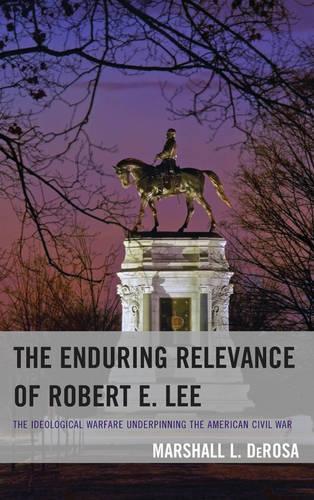
The Enduring Relevance of Robert E. Lee: The Ideological Warfare Underpinning the American Civil War
(Paperback)
Publishing Details
The Enduring Relevance of Robert E. Lee: The Ideological Warfare Underpinning the American Civil War
By (Author) Marshall L. DeRosa
Bloomsbury Publishing PLC
Lexington Books
14th October 2015
United States
Classifications
Professional and Scholarly
Non Fiction
Early modern warfare (including gunpowder warfare)
History of the Americas
Military history
973.7092
Physical Properties
Paperback
176
Width 154mm, Height 228mm, Spine 13mm
272g
Description
The sesquicentennial of the American Civil War presents a unique opportunity to consider the motivation behind General Robert E. Lees efforts to defend the Confederacy against his once beloved United States. What will be learned from this book is that General Lee was following in the footsteps of his idol General George Washington. General Lee was not fighting to perpetuate and expand slavery, self-aggrandizement, or military glory. He was fighting for the 1776 principles of government based upon the consent of the governed, the 1789 principles of the rule of law, and for a Judeo-Christian based civilization. While Lees military genius and commitment to duty are widely acknowledged, his political acumen is, for the most part, underrated. Master of the art of politics as much as war, which is politics by other means, Lee considered both normative arts concerned with the happiness and noble actions of the citizens. In fact, Lees successes and failures on the battlefield were due in large measure to his worldview that if the Confederacy were to survive its citizenry must act nobly. According to Lee, it is in noble actions that human happiness is to be achieved. For Lee, the soldier and citizen performing their respective duties were on the paths to individual happiness and, ultimately, a free and independent CSA. In The Enduring Relevance of Robert E. Lee Marshall L. DeRosa uses the American Civil War and the figure of Robert E. Lee to consider the role of political leadership under extremely difficult circumstances and the proper response to those circumstances. DeRosa examines Lee as a politician rather than just a military leader and finds that many of Lees assertions are still relevant today. DeRosa reveals Lees insights and his awareness that the victory of the Union over the Confederacy placed America on the path towards the demise of government based upon the consent of the governed, the rule of law, and the Judeo-Christian American civilization.
Reviews
This book deserves a careful read to extract the enduring elements of leadership in a lost cause that should not be lost from our historical understanding. * On Point: The Journal of Army History *
In opposition to the prevailing, ideologically-driven attempt among scholars to depict Robert E. Lee as a contradictory, problematic, or unfathomable military commander and statesman, DeRosas The Enduring Relevance of Robert E. Lee allows the thoughtful reader to encounter the authentic genius of Lee the American patriot who sought to perpetuate the General patrimony of the founding generation amidst tremendous social and political tensions. DeRosa also corrects a litany of misinterpretations of Lee from a variety of perspectives while affirming the prophetic vision of Lee as political thinker who warned of the creation of a vast republic that would be aggressive abroad and despotic at home. This book fills a critical lacuna in current scholarship. -- H. Lee Cheek Jr., East Georgia State College
Not long ago Robert E. Lee stood high in the pantheon of American heroes. Franklin D. Roosevelt, Winston Churchill, Dwight D. Eisenhower, and a host of others eloquently testified to Lees exemplary character as well as his greatness as a soldier. The ongoing trivialization of American history into nothing more than a morality play about slavery has led the great man to fall from glory. Professor DeRosa persuasively argues that this is a mistake, that Lee remains vital because he symbolizes an alternative idea of American society and government to the present regime. Along the way we learn that Lee, along with his other qualities, was a very wise man with a deep conception of historyunlike most American leaders of his time or ours. -- Clyde N. Wilson, University of South Carolina
After the war, Lee said the Union victory meant the central government would become progressively tyrannical at home and aggressive abroad. Marshall DeRosas book explains what Lee meant by this, and why an understanding of his character and career is necessary if Americans are ever to recover the liberty he fought to preserve. -- Donald Livingston, Emory University
Author Bio
Marshall L. DeRosa is professor of political science at Florida Atlantic University.
